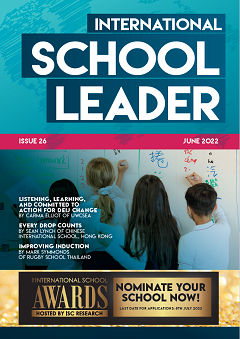By Jacob Martin
The Ethical Values Education award at this year’s International School Awards was won by Dulwich College Singapore for a compassionate systems framework developing students’ emotional literacy. Here, Jacob Martin shares details of the initiative.
As we find ourselves navigating a world changed significantly by the pandemic, forcing separation and disruption on all of us, two of the educational priorities of our College are shared by many other institutions determined to look after the youth of today and the adults of tomorrow.
Wellbeing and compassionate action have swelled in importance and become ever more significant in our lives and our hopes for the future. Encouraging a systemic understanding of the interconnectedness of human beings is an increasingly important part of the learning programme for all of our students. Although many institutions have similar intentions and equally laudable aims, the development of these ideas practically and in a classroom context that directly influences student learning can often be the most challenging part. Our work, which is linked to the global Massachusetts Institute of Technology (MIT)-led project, the Compassionate Systems Framework, is our practical route to achieving these lofty goals. In our second year of work in this area, we are already seeing some outstanding student outcomes.
The compassionate systems framework
The framework combines two key components. The first is a series of system thinking tools that can be used in any curriculum context to help students understand the deep interconnectedness of the issues we discuss in the classrooms. These tools also structure the learning and encourage a conceptual understanding of the issue being studied; they are used, in particular, to explore complex issues like the United Nations Sustainable Development Goals, which are the focus of many areas of our curriculum.
One example of a system thinking tool is the connection circle, a graphic organiser, which shows connections between different factors or elements of a complex system. The arrows within the circle identify cause-and-effect relationships. The tool can be developed to include feedback loops and other more complex relationships.
The connection circle allows students to identify and link together a number of factors that are relevant to a question or problem, expanding their awareness of connections within systems. It enables them to understand how making one change can have widespread and unexpected impact and to identify causal loops.
The tool encourages compassionate thinking by enabling students to be open-minded through understanding multiple perspectives and contexts that are relevant to a real-life problem. It encourages them to think more critically about the connections and impacts of the many elements and through understanding these connections between different elements in a system, students are able to understand why people may make decisions different to their own. By understanding the intended and unintended impact of their own and other’s actions, they can think more compassionately about the choices they make.
The second component is a set of practices and approaches which work to develop emotional literacy with the students and teachers. Students gain a deep understanding of some of the world’s most challenging issues, and gain the empathy to appreciate the human connectedness in these issues whilst not becoming psychologically overwhelmed by the challenges they bring. The learning skills acquired to understand these complex issues allow our students to understand and approach other complex understandings in all areas of their learning as they progress.
Putting it into practice
As an example, some of our younger students have been embracing their journey of learning with the Compassionate System’s Framework to really explore their understanding of themselves and the world around them.
Many of our class groups have decided on their own personalised emotional daily check-in system, allowing them to examine their emotions and the importance of different cause-and-effect factors that influence human behaviour. They have been paying attention to the various ways they and their peers ‘show up’ for the school day. This helps to normalise the different states of emotions and opens up deeper communication channels within our classrooms. The students are beginning to understand the complexity of human relationships. It is important to recognise this in order to explore the different internal and external influential factors on human behaviour.
Through wellbeing lessons, our students have been introduced to the concept of Generative Social Fields. This is a Compassionate Systems concept that provides the children with a visual guide to discover their range of emotions and how these may alter with changing circumstances.
Enabling change
As with most cultural change processes that are deeply felt by a community or school, the initiative cannot be implemented. The Compassionate Systems Framework required teachers and students to come to it with open hearts and open minds. This type of mindset is only possible when we genuinely wish to emotionally engage with a project that, as educators, we feel will benefit our students.
The approach we took was to phrase all of our interactions as an invitation. Teachers who were interested or motivated by the aims of the project were invited to some voluntary professional development workshops. These workshops developed some champions for the approach, and when they were ready to start using the ideas with teachers, the facilitators of the workshops co-taught with the champions and evaluated the impact. These champions then informally invited other teachers to be involved and offered them their own support.
Over time, this organic approach to growing capacity, coupled with growing a community, has allowed to us slowly develop a change in our culture where emotional wellbeing and global citizenship are naturally at the forefront of many of our learning experiences.
Sustaining cultural change
The maintenance of a cultural change project like this is a real challenge for most institutions and we are hoping to use one of our own compassionate systems tools, the ‘mandala for systems change’ to help us with that.
Like all mandala, it is an organising structure for a complex idea. The idea is deep systemic change, and the mandala identifies four key areas of action required for a project like this to be successful.
If we acknowledge the natural tensions that exist across the mandala, the tension between researching and finding out more about something (research) and actually doing it (practice) is something very familiar. Equally the tension between building a large community of interested parties and then training and supporting that community is also something many school leaders will be familiar with. Our approach moving forward is to work on all these four areas and to continuously repeat our reflective practices around this mandala to continuously sense how the project is growing.
We are still in the earliest stages of our journey with these amazing ideas, but the impact on our students and teachers is already so clear that we will remain passionate advocates for this student-focused project.
I would like to formally acknowledge the work of Peter Senge and Mette Böll and the IB organisation, in particular Jane Drake, for developing the work and designing the tools and the mandala referenced in this article at the Centre of Systems Awareness at MIT. They are an extraordinary group of people working to build a better world and I heartily recommend their work.
 Jacob Martin is Assistant Head of College at Dulwich College (Singapore). Connect directly with Jacob on LinkedIn.
Jacob Martin is Assistant Head of College at Dulwich College (Singapore). Connect directly with Jacob on LinkedIn.
Subscribe to ISL Magazine for more!


